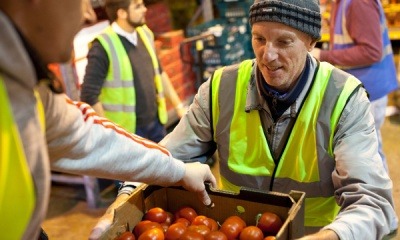Government makes £3.25m emergency food surplus grant available
The government has announced grant funding of £3.25 million to be made available to food redistribution organisations to ensure surplus food can reach those in need during the Covid-19 pandemic.
The grant, announced on Friday (2 April), is to be provided by the Department for Environment, Food and Rural Affairs (Defra) as part of the Resource Action Fund and will be managed by the Waste and Resources Action Programme (WRAP).
The aim of the Covid-19 Emergency Surplus Food Grant is to assist surplus food redistributors struggling to obtain surplus food in the current climate where operational barriers in food redistribution have risen, volunteer numbers have dropped and sources of surplus food, such as cafes and restaurants, have shut.
The grant will help to distribute up to 14,000 tonnes of surplus stock to those in need, such as those who are unable to feed themselves, the elderly and people who are self-isolating.

The grant funding will be used to fund both capital and revenue costs associated with redistribution activities such as: access to surplus food through logistical collections; sorting, storing, freezing, labelling/repackaging food; and onward distribution of food to charities or end beneficiaries.
Commenting on the funding, WRAP Chief Executive Marcus Gover said: “It is critical in these unprecedented times that we maximise the amount of surplus food redistributed. These grants offer crucial financial support to redistribution organisations, where it will have the most impact. We know from managing redistribution funds that this money will make a huge difference to many people.”
Read more: Four ways to reduce food waste during the coronavirus lockdown
Environment Minister Rebecca Pow added: ”I am proud of the many organisations across the UK working to ensure food and supplies are provided to those who need it most during this challenging time.
“This funding will support people in need while ensuring that we minimise the amount of food which goes to waste – benefiting both society and the environment.”
Funding “will make an enormous difference”
The delivery of the funding will be over three phases over the coming month, with all food redistribution groups and charities encouraged to bid for funding. First, WRAP will approach a target list of small retribution organisations, previous applicants for funding, to ascertain their immediate need for financial support. Then, on Thursday 9 April, opportunities will be opened for small surplus food distributors. Finally, funding support for medium to larger operators will be launched.
Commenting, WRAP’s Director Dr Peter Maddox said: “We’re starting with micro operations for whom a few thousand pounds will make an enormous difference and bring extra storage, better transport, equipment and so on. The idea of new fridges or a van may seem quite inconsequential, but this can make all the difference to a small group of volunteers trying to get food to the community.
“Within days we’ll offer a similar scheme to medium sized organisations, and will also help larger operators, who need money to unblock their own bottlenecks.”
Rene Meijer, the Chief Executive of The Food Works, a Sheffield-based food distribution organisation, said: “Over the past two weeks we have doubled the amount of food we redistribute, as many tonnes of food goes spare from businesses closing and people change their shopping habits.
“Surplus food redistribution is all about providing resilience to the community, and at a time like this we need resilience more than ever to ensure good food does not go to waste and reaches those who need it.”
The role of surplus food redistribution in cutting food waste was placed at the heart of the government’s Resources and Waste Strategy, and in January 2019 Defra created a £5-million Food Waste Reduction Fund for food redistributors. This was part of a £15-million food waste reduction scheme aiming to give those in need greater access to surplus food whilst also curbing food waste.
Food sharing apps such as OLIO and community good causes sites like Neighbourly are also hoping to facilitate food redistribution during the coronavirus outbreak. OLIO, which operates in 49 countries globally, is responding to the coronavirus pandemic by organising no-contact pickups to share surplus food safely in communities.
While redistribution of surplus food to those that need it through organisations such as food banks is the optimal way to prevent food waste after preventing waste in the first place, these groups have called for wider government help to lift people out of poverty so that people don't need to rely on food redistribution at all. Sabine Goodwin, Coordinator of the Independent Food Aid Network, said: "Independent food banks need all the help they can get right now but the redistribution of surplus food is not a long-term solution to the desperate poverty driving the escalating need for food banks. The UK Government needs to act immediately to reduce the need for charitable food aid aid by eliminating the five-week wait for Universal Credit, ending the two-child limit, increasing child benefit and providing funds to local authorities to ensure crisis grants are available to people in need."








